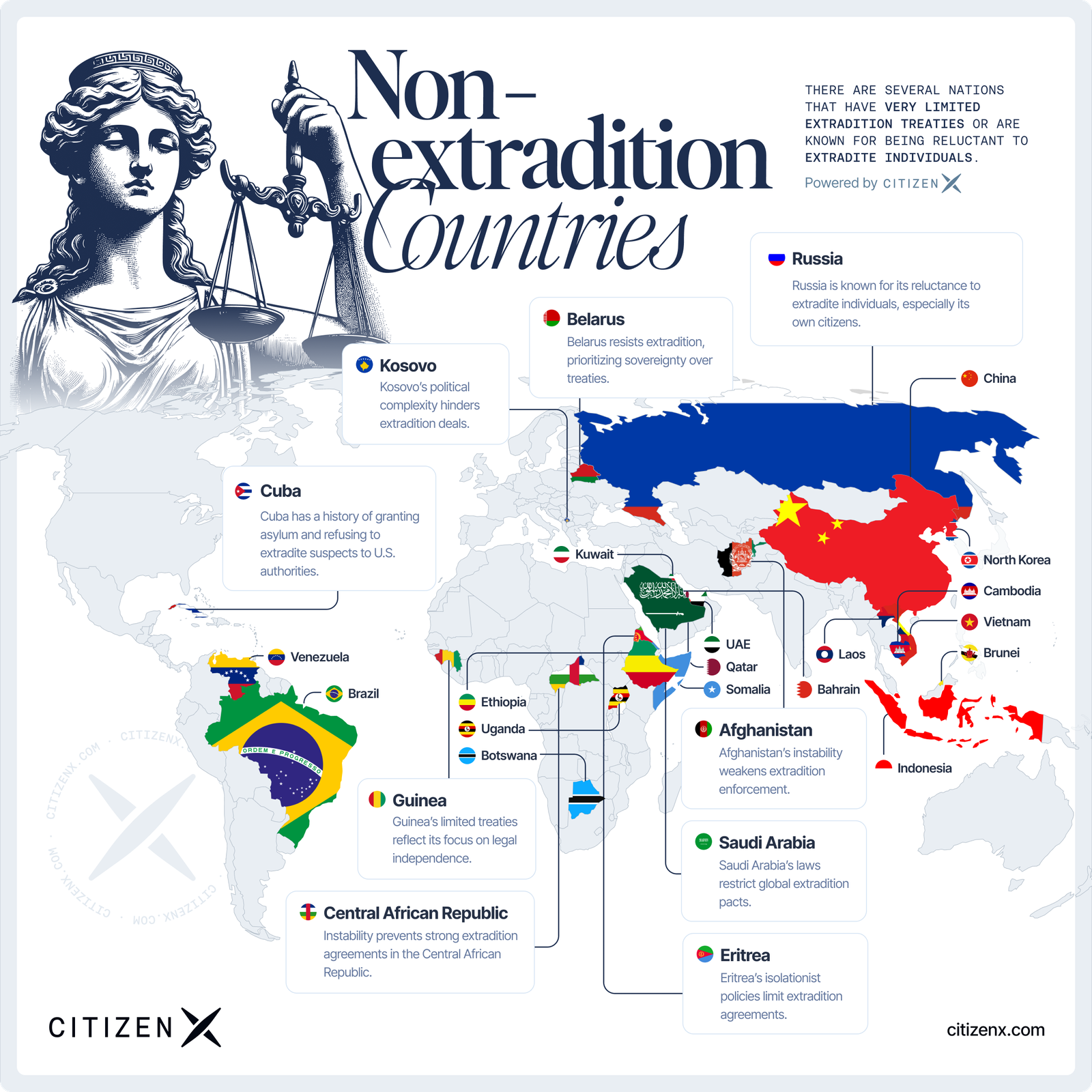Non-extradition countries are often discussed in the context of individuals seeking "safe havens" from prosecution.
In practical terms, these are nations that do not have a formal extradition treaty in place with a specific requesting country.

When it comes to Canada, navigating this global web of extradition agreements can be intricate.
That's because Canada—known for its robust extradition law and well-developed legal system—manages extradition proceedings under a comprehensive framework that involves both national and international law.
In major Canadian cities like Toronto, the legal process still follows federal guidelines but can reflect local nuances and resources.
What makes a country non-extradition
A foreign country is often deemed non-extradition if it has no binding extradition treaties with Canada. Without these agreements, Canada may still make extradition requests, but each situation proceeds on a case-by-case basis.
Such cases hinge on factors like human rights, diplomatic relations, and dual criminality.
Understanding this designation requires examining both formal treaties and informal cooperation agreements between nations. Some countries may lack official extradition treaties but maintain strong law enforcement partnerships that facilitate similar outcomes.
How Canada approaches extradition matters
Canada's extradition process is guided by the Extradition Act, which sets criteria for surrender to a requesting country, details how arrest warrants are handled, and outlines when extradition proceedings may be denied.
The act also contemplates whether the individual might face cruel treatment—such as the death penalty—in the requesting state.
Canadian authorities weigh international law standards and the calibre of the other nation's legal system, ensuring law enforcement aligns with human rights.
Nations with longstanding ties to Canada—like France, Germany, Spain, and the United Kingdom—often have clear protocols in place, simplifying the legal framework.
Beyond the formal framework, Canada's approach incorporates modern technological capabilities and evolving international standards.
Digital evidence, cybercrime considerations, and cross-border data sharing have become increasingly important factors in extradition decisions.
The Canadian justice system continuously adapts its procedures to address these emerging challenges while maintaining fundamental fairness principles.
Complex realities of non-extradition
Even without formal extradition treaties, some states—such as Vietnam or Lebanon—may opt to assist Canada if shared interests or specific law enforcement concerns exist.
This underscores why each matter is better approached on a case-by-case basis than a universal rule. Referring to "non-extradition countries" can be an oversimplification, given how factors like diplomatic relations and international law shape the extradition process.
Many nations that lack official extradition treaties with Canada may still cooperate to some degree.
Complete list of non-extradition countries relative to Canada
For reference, here are the primary countries that currently do not maintain formal extradition treaties with Canada.
List of Countries
- Afghanistan
- Algeria
- Armenia
- Belarus
- Bolivia
- Brunei
- Cambodia
- China
- Cuba
- Ecuador
- Ethiopia
- Hong Kong
- Iran
- Iraq
- Kazakhstan
- Kuwait
- Laos
- Lebanon
- Libya
- Madagascar
- Maldives
- Mongolia
- Myanmar
- Nicaragua
- North Korea
- Oman
- Qatar
- Russia
- Saudi Arabia
- Somalia
- Syria
- Taiwan
- Tunisia
- United Arab Emirates
- Ukraine
- Uzbekistan
- Vatican City
- Venezuela
- Vietnam
- Yemen
Regional perspectives on extradition relationships

Understanding Asia and the Middle East dynamics
Countries like China, North Korea, Iran, and Saudi Arabia frequently raise questions about extradition treaties due to differences in legal systems or human rights concerns.
These nations often maintain their own distinct judicial processes that may not align with Canadian standards of due process.
Others, including the UAE (United Arab Emirates), Qatar, Afghanistan, Yemen, Brunei, Cambodia, Maldives, and Mongolia, may have evolving or minimal arrangements.
The rapid economic development in many of these countries has created new challenges for international legal cooperation.
Each nation in this region presents unique diplomatic and legal hurdles that must be carefully navigated.
These regions present unique challenges due to:
- Varying interpretations of criminal justice
- Different approaches to human rights
- Complex diplomatic relationships
- Distinct legal traditions and systems
Additional regional considerations include:
- Rapidly evolving technological surveillance capabilities
- Different standards for evidence collection and preservation
- Varying approaches to cybercrime and digital offenses
- Complex interplay between religious and secular law
- Emerging financial systems and cryptocurrency regulations
Exploring African relationships
Several African nations—such as Algeria, Ethiopia, and Somalia—lack formal extradition agreements with Canada but can be approached individually.
The political stability of these nations can significantly impact the reliability of any informal arrangements.
Regional organizations like the African Union sometimes play a mediating role in extradition matters.
In countries like Zimbabwe, Botswana, and Tunisia, bilateral talks sometimes open channels for cooperation.
These nations often demonstrate willingness to engage in case-by-case negotiations despite lacking formal treaties.
The African continent presents particular considerations including:
- Evolving legal systems and governance structures
- Regional cooperation agreements that may influence extradition
- Historical ties and colonial legal legacies
- Capacity challenges in legal and judicial systems
Additional factors shaping African extradition dynamics include:
- Rapid urbanization and changing demographics
- Emerging technology infrastructure
- Regional economic integration efforts
- Cross-border tribal and ethnic considerations
- Impact of international development partnerships
- Growing influence of pan-African legal frameworks
Navigating European and Eurasian considerations
While Russia and Belarus are typically listed as non-extradition states, actual diplomatic relations can be more nuanced.
Recent geopolitical developments have further complicated legal cooperation with these nations.
Moldova, Armenia, Iceland, Ukraine, and Montenegro have unique legal frameworks.
Each of these countries maintains distinct relationships with both the European Union and other regional powers.
Switzerland, though often mistaken as non-extradition, follows a distinctly regulated process centered on neutrality and data confidentiality.
The European context adds several layers of complexity:
- Influence of EU regulations and directives
- Role of the European Court of Human Rights
- Impact of Schengen Agreement provisions
- Bilateral investment treaties affecting movement
- Cybersecurity cooperation frameworks
- Financial intelligence sharing networks
Understanding the Americas and beyond

In the Americas, Cuba, Venezuela, Bolivia, Nicaragua, and Ecuador frequently appear in "non-extradition" discussions.
Historical political tensions have shaped many of these relationships.
The rise of regional trade agreements has created new avenues for legal cooperation.
Mexico, on the other hand, holds formal extradition treaties with Canada, yet cooperation depends on evidence standards and shared diplomatic relations.
Cross-border law enforcement initiatives have strengthened cooperation despite political differences.
Regions like Hong Kong add another layer of complexity, as political changes and unique legal arrangements can shift how extradition is handled.
The Americas present distinct regional dynamics:
- Impact of multilateral organizations like OAS
- Role of narcotics enforcement cooperation
- Influence of migration patterns
- Effect of trade relationships on legal cooperation
- Growing importance of cybercrime jurisdiction
- Evolution of mutual legal assistance treaties
Additional considerations for the Americas include:
- Indigenous rights and territorial jurisdiction
- Environmental crime enforcement
- Maritime law enforcement cooperation
- Technology sector growth and data privacy
- Regional financial integration impacts
- Cross-border organized crime initiatives
How dual criminality shapes extradition decisions
Dual criminality means the alleged offense must be deemed criminal in both Canada and the requesting country. If someone is accused of an act that is unlawful in China or Iran yet not an offense under Canadian law, an extradition bid may fail.
Courts in Canada also assess human rights concerns—such as whether the accused could face the death penalty, torture, or an unreliable legal process abroad.
The principle of dual criminality has evolved to address modern challenges, including technological crimes and financial offenses that may be treated differently across jurisdictions.
Canadian courts must often interpret equivalent offenses in foreign legal systems, considering both the elements of the crime and the underlying conduct.
Examining the legal process on a case-by-case basis
Despite multiple extradition agreements, decisions often play out on a case-by-case basis.
Canadian courts look at evidence strength, validity of an arrest warrant, and the requesting state's legal frameworks.
This applies equally to nations like North Korea and Belarus, with which diplomatic relations can be fragile.
It also applies to places such as Indonesia, where some charges overlap significantly with Canada's criminal code, yet final outcomes still hinge on local laws and bilateral cooperation.
The individualized nature of extradition proceedings allows for consideration of unique circumstances, including:
- The specific nature and severity of the alleged offense
- The quality and reliability of evidence presented
- The current political and social conditions in the requesting country
- The accused person's personal circumstances and potential vulnerabilities
How modern factors influence extradition processes
Besides the existence or absence of formal extradition treaties, other elements determine whether extradition proceeds.
The contemporary landscape of international relations, digital technology, and global mobility has introduced new considerations in extradition matters.
Examining diplomatic relations in today's context
Strong diplomatic relations between Canada and a given country can enable effective collaboration, even if formal extradition treaties are incomplete.
For example, if Canada and Indonesia both prioritize prosecuting certain crimes, they may still coordinate extradition proceedings.
Conversely, lacking diplomatic connections—perhaps with Syria or Iran—hinders effective legal collaboration.
Modern diplomatic considerations now include:
- Cybersecurity cooperation agreements
- Information sharing protocols
- Joint law enforcement initiatives
- International organization memberships
Understanding political and humanitarian grounds
Canada's stance against the death penalty greatly affects extradition outcomes, since handing someone over to face capital punishment runs counter to human rights norms. Likewise, any proof of persecution for political or religious reasons often triggers deeper investigation under Canada's extradition law, ensuring alignment with international law.
Common Misconceptions and Potential Pitfalls
Relying solely on a “non-extradition” label can lead to oversights that leave you vulnerable. Even when a country lacks a formal extradition treaty with Canada, that doesn’t always guarantee absolute protection from legal repercussions.
- Deportation vs. Extradition
While extradition follows a legal process with court hearings and formal approvals, deportation can happen on administrative grounds. A nation may still expel someone deemed undesirable, effectively sidestepping the conventional extradition framework. - Ad Hoc Cooperation
Countries that do not officially recognize extradition requests can still decide to comply if pressured by major partners, or if a serious crime prompts mutual assistance. Governments may also use informal channels for intelligence sharing and coordinated arrests. - Secondary Consequences
Being in a so-called “safe haven” does not shield your business interests, financial assets, or overseas investments. Freezing orders, asset seizures, and cross-border immigration restrictions are real possibilities if authorities believe you’re evading justice. - Essential Due Diligence
Non-extradition status should never be your sole strategy. Each jurisdiction has unique rules, and political climates can shift rapidly. Always seek qualified legal counsel to assess your risks, rights, and the broader implications of relocating under these circumstances.
Choosing a non-extradition country — Legalities, lifestyle, and tax
The best defense against unwanted extradition and overreach and even military conscription is a passport portfolio and optionality around the world.
Global citizenship is a collateral damage of WEF's globalist agenda.
— Alex Recouso (@alexrecouso) February 1, 2025
CitizenX is for decentralized localization. https://t.co/IdKTkyTLLr
Legal Factors When Leaving Canada
For individuals considering relocation to a non-extradition country, understanding Canada’s extradition laws is critical.
Canada has extensive treaties with numerous countries, meaning legal proceedings can be complex. Before making any decisions, individuals should research potential destinations and consult legal experts to fully grasp their rights and the risks involved.
Lifestyle and Infrastructure Abroad
Relocating from Canada to a non-extradition country isn’t just a legal maneuver—it’s a major lifestyle change. The quality of life, healthcare systems, language barriers, and ease of integration into a new culture all play a role in a successful transition. Infrastructure, safety, and local support networks should also be key considerations when choosing a destination.
Tax and Financial Considerations
Leaving Canada for a non-extradition country comes with significant financial implications. Canadian tax laws may still apply in certain cases, and different jurisdictions have varying tax structures that can affect long-term wealth management. High-net-worth individuals must carefully evaluate potential tax obligations, banking restrictions, and asset management strategies before making a move.
In particular, you always have to look out for the exit tax upon leaving to a non-extradition country.
Finding your path to sovereignty with CitizenX
At CitizenX, our goal is to offer a modern, strategic path to global mobility—one that is bold, reassuring, and informed.
While extradition is a complex topic, understanding the legal frameworks of prospective nations is a tactical step in extending your freedom.
Creating a secure digital approach
Cross-border legalities—including extradition requests or potential formal extradition treaties—can be intimidating.
Our platform draws on advanced data privacy measures grounded in Switzerland, giving you a trusted system for exploring multiple jurisdictions.
You remain in full control of your data, and we simplify the process to create a secure, elevated experience.
Developing your passport portfolio
Diversifying your "passport portfolio" goes beyond searching for "non-extradition countries."
It involves ensuring you have safe, flexible alternatives—whether for professional growth, personal safety, or investment.
Through CitizenX, you can assess second citizenships in places with reliable law enforcement, robust human rights standards, and supportive diplomatic relations.
We guide you in finding genuine global freedom, releasing you from any single legal process that might limit your options.
Final thoughts on navigating extradition complexities
Canada's extradition act and its relationship with non-extradition countries may appear complicated, but the core principles—dual criminality, human rights, international law, and local legal systems—remain consistent.
Anyone exploring the wider world, whether for potential safe havens or to understand the rules of a particular foreign country, benefits from trusted insight. CitizenX is committed to delivering a premium, digitally native experience that empowers you to engage internationally on your own terms.
We envision a future where freedom is not a luxury but a deliberate, well-informed decision. By blending superior technology, expertise, and genuine respect for personal sovereignty, we help you navigate extradition laws and beyond.
Together, we can reimagine citizenship—and open a more prosperous, free world for all.

